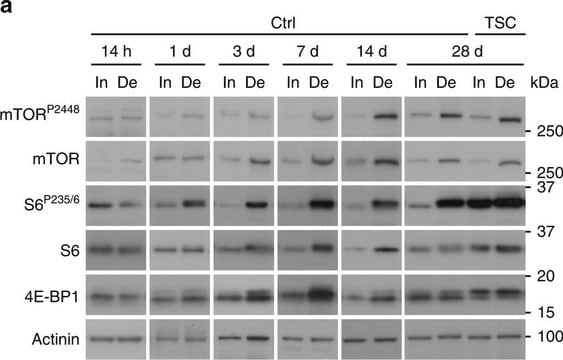05-384
Anti-α-Actinin Antibody, clone AT6/172
clone AT6/172, Upstate®, from mouse
Synonyme(s) :
Anti-BDPLT15
About This Item
Produits recommandés
Source biologique
mouse
Niveau de qualité
Forme d'anticorps
purified immunoglobulin
Type de produit anticorps
primary antibodies
Clone
AT6/172, monoclonal
Espèces réactives
rabbit, human, mouse
Fabricant/nom de marque
Upstate®
Technique(s)
immunocytochemistry: suitable
western blot: suitable
Isotype
IgG1
Numéro d'accès NCBI
Numéro d'accès UniProt
Conditions d'expédition
dry ice
Modification post-traductionnelle de la cible
unmodified
Informations sur le gène
human ... ACTN1(87)
Spécificité
Immunogène
Application
Cell Structure
Cytoskeleton
Qualité
Description de la cible
Forme physique
Stockage et stabilité
Remarque sur l'analyse
Positive Antigen Control: Catalog #12-301, non-stimulated A431 cell lysate. Add 2.5µL of 2-mercaptoethanol/100µL of lysate and boil for 5 minutes to reduce the preparation. Load 20µg of reduced lysate per lane for minigels.
Informations légales
Clause de non-responsabilité
Not finding the right product?
Try our Outil de sélection de produits.
Code de la classe de stockage
12 - Non Combustible Liquids
Classe de danger pour l'eau (WGK)
WGK 2
Point d'éclair (°F)
Not applicable
Point d'éclair (°C)
Not applicable
Certificats d'analyse (COA)
Recherchez un Certificats d'analyse (COA) en saisissant le numéro de lot du produit. Les numéros de lot figurent sur l'étiquette du produit après les mots "Lot" ou "Batch".
Déjà en possession de ce produit ?
Retrouvez la documentation relative aux produits que vous avez récemment achetés dans la Bibliothèque de documents.
Notre équipe de scientifiques dispose d'une expérience dans tous les secteurs de la recherche, notamment en sciences de la vie, science des matériaux, synthèse chimique, chromatographie, analyse et dans de nombreux autres domaines..
Contacter notre Service technique






![E-64 N-[N-(L-3-Trans-carboxirane-2-carbonyl)-L-leucyl]-agmatine](/deepweb/assets/sigmaaldrich/product/structures/168/240/c77e3f6a-6709-4d17-b774-b850e8a54a51/640/c77e3f6a-6709-4d17-b774-b850e8a54a51.png)